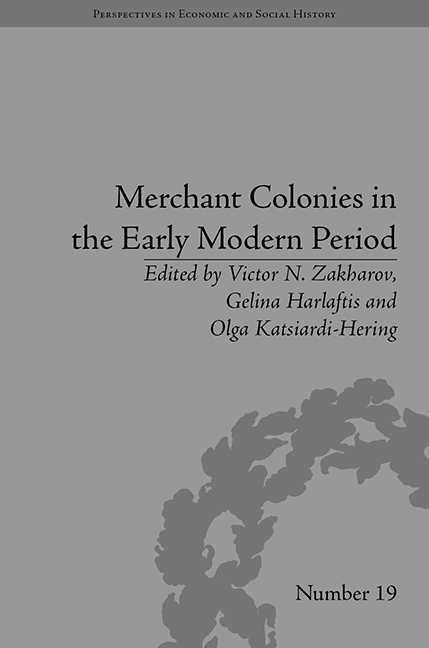Book contents
- Frontmatter
- Contents
- List of Figures and Tables
- List of Contributors
- Introduction
- 1 Early Modern English Merchant Colonies: Contexts and Functions
- 2 German and Italian Merchant Colonies in Early Modern England
- 3 Dynamism and Integration of the North European Merchant Communities in French Ports in the Eighteenth Century
- 4 Opportunity and Legislation: How the Armenians Entered Trade in Three Mediterranean Ports
- 5 Russian Merchant Colonies in Seventeenth-Century Sweden
- 6 Foreign Merchant Communities in Eighteenth-Century Russia
- 7 Greek Merchant Colonies in Central and South-Eastern Europe in the Eighteenth and Early Nineteenth Centuries
- 8 Community for Commerce: An Introduction to the Nezhin Greek Brotherhood Focusing on its Establishment as a Formal Institution in the Years Between 1692 and 1710
- 9 Entrepreneurship at the Russian Frontier of International Trade. The Greek Merchant Community/Paroikia of Taganrog in the Sea of Azov, 1780s–1830s
- Notes
- Index
Introduction
- Frontmatter
- Contents
- List of Figures and Tables
- List of Contributors
- Introduction
- 1 Early Modern English Merchant Colonies: Contexts and Functions
- 2 German and Italian Merchant Colonies in Early Modern England
- 3 Dynamism and Integration of the North European Merchant Communities in French Ports in the Eighteenth Century
- 4 Opportunity and Legislation: How the Armenians Entered Trade in Three Mediterranean Ports
- 5 Russian Merchant Colonies in Seventeenth-Century Sweden
- 6 Foreign Merchant Communities in Eighteenth-Century Russia
- 7 Greek Merchant Colonies in Central and South-Eastern Europe in the Eighteenth and Early Nineteenth Centuries
- 8 Community for Commerce: An Introduction to the Nezhin Greek Brotherhood Focusing on its Establishment as a Formal Institution in the Years Between 1692 and 1710
- 9 Entrepreneurship at the Russian Frontier of International Trade. The Greek Merchant Community/Paroikia of Taganrog in the Sea of Azov, 1780s–1830s
- Notes
- Index
Summary
The purpose of this book is to examine the history of ‘merchant colonies’ and their importance in the European international trade in the early modern period (late fifteenth–eighteenth centuries). Traditionally the term ‘merchant colony’ has been used in connection with the formation of European economic empires as territories under the immediate political control of an empire. This book, however, is not about European colonization in overseas territories but about foreign merchant colonies or ‘merchant communities’ in Europe established to carry international and national trade between empires and states.
Frederic Mauro defines a merchant community as an association or unit of merchants who shared a similar background and provided each other with any cooperative assistance needed in their foreign environment. He then proceeds into a chronological and systematic distinction of the merchant colonies in two periods: the first one covers the period of the fourteenth–sixteenth centuries and the second one from the seventeenth to the eighteenth century. It is commonly accepted that European land and seaborne trade has traditionally been connected with the establishment of foreign merchants in major European cities where the terms ‘merchant community’ and ‘community of foreign merchants’ were often synonymous. The foreign merchant communities were characterized by solidarity, mutual aid, kinship and a desire to preserve their culture.
- Type
- Chapter
- Information
- Merchant Colonies in the Early Modern Period , pp. 1 - 10Publisher: Pickering & ChattoFirst published in: 2014



